Prestige issue 286, Oct-Nov. 2017
I would say of her that she is sympathetic, spontaneous and warm. Tall with golden hair and clear eyes. A porcelain doll face. If physically she is the portrait of her mother, she is indeed the daughter of her father, as to herpersonality, this exceptional man, president-general Michel Aoun. Charismatic Claudine Aoun Roukoz, she has the gift to speak and does not hesitate to face the challenges. A mother of five children, juggling with several functions, she does not drop her convictions easily. She knows the reality of the terrain, and her leitmotiv, being at the service of others and trying to erase the injustices. Her dream? A green country where life would be enjoyable. Her ambition? Continue to flirt with politics, because the front of the stage is occupied by her father and then also, who knows, maybe one day her husband, General-Commander Chamel Roukoz. Endearing Claudine Aoun Roukoz, because authentic, without fuss or frills. I see her well as a leader, her positivity, her aspiration for happiness is contagious. We’re under the spell. An open interview with a clever woman from our country.
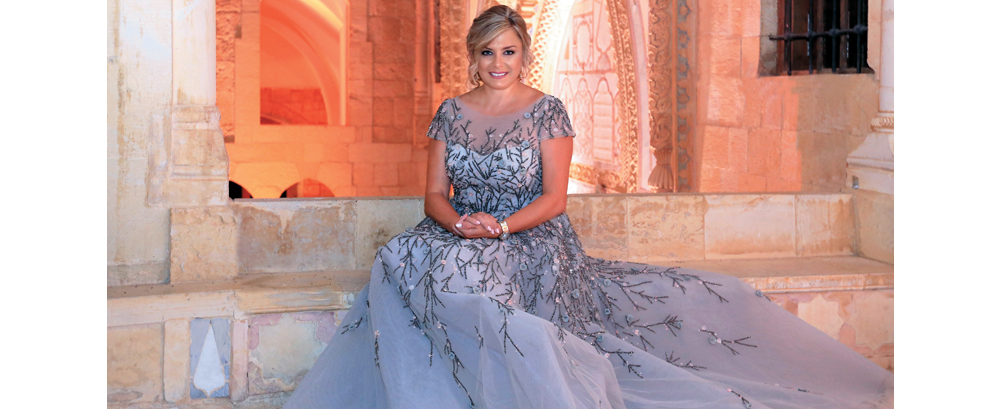
What is exactly the function of personal adviser of the President of the Republic? By the way my exact title is: Special Assistant to the President. I assist him in several projects and files, such as the communication and organization of the events taking place at the palace, as well as the study of the files and their coordination, in particular with regard to the environment. The Animal Welfare Act has been approved and we are working on the implementation of the hunting legislation and regulations that are about to start for the first time in 20 years. Concerning the protection of migratory birds, Lebanon has signed international conventions and I ensure that they are respected. I also preside over the National Commission for Lebanese Women, which defends the rights of women in regards to the laws. We prepare parliamentary bills, communications campaigns, training sessions for judges and social workers. Being a Special Assistant to the President encompasses a wide range of activities, covering all areas.
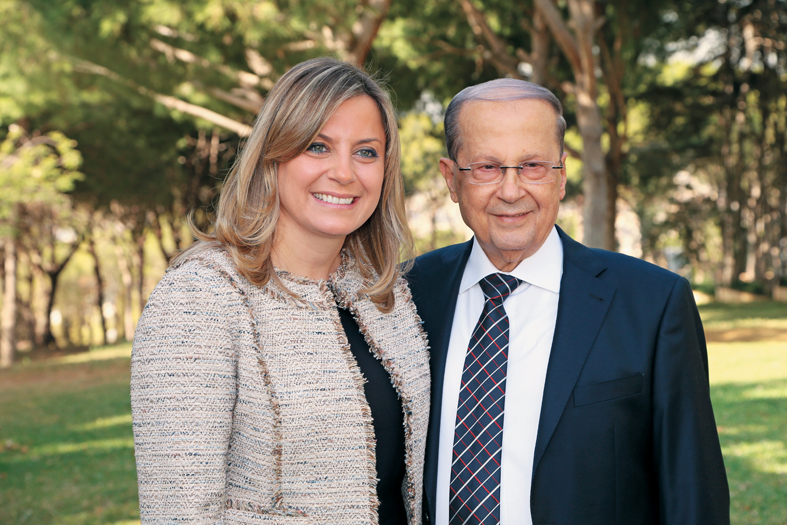
«Everyone must have a mission in life. I have mine.»
As the president of the Lebanese National Commission for Women, what are your main objectives? Our main goals are to ensure the rights of women and their equality with men at all levels, through laws and their application, or within the workspace and professional relations. Rights relating to violence against her, to the prohibition of the marriage of minors, to her right to social security and to the same benefits as men, and to the right to give nationality. Many causes are to be defended. Lebanon has reservations to CEDAW (Article 17 of the Committee on the Elimination of Discrimination against Women), which relate to nationality and personal status. We will work to remove them.
The participation of the Lebanese woman in political life is very weak, whether at the level of legislative representation or the executive and even within the various political parties. Countries like France and Argentina have established parity with great success, don’t you think it is time to follow the example? Would not that be the solution? In terms of parity, we did not get it, despite our battle in that direction, and we did not get it in the Elections Act. A coalition was formed, chaired by the Commission and made up of all NGOs concerned with the role of women in political life. But the law was promulgated and the women did not get the quota claimed. I am working to boost the women in the parties, to create a movement and to impose the candidates, regardless of the choice or the refusal of the parties. Women will be able to express their ambitions and decide to participate in Parliament or in government. This must absolutely begin to move. We are supposed to have many candidates for the legislative elections, and create the atmosphere conducive to their candidacy. Parity is a very long-term struggle, even in Europe it is not fully assured in professional circles.

Lebanon suffers from the departure of his youth, especially graduates, because of the lack of opportunities and the static economic situation. How can we give them confidence in their country and encourage them to stay and invest in it? You studied in France at the Sorbonne and you came back to create your company Clémentine. The labor market in Lebanon has always been limited. It is a small country and demographic change means there are not much chances. This is one of the reasons, but not the only one. One solution would be, in my view, decentralization. I am not an expert in economics or finance, but I know that we need to develop regions and small communities so that their inhabitants stay there and live decently and with dignity. There are obviously many economic decisions to be made, with the help of experts in this field. Going back to market opportunities, we need an economic plan and appropriate measures to find out what areas are suitable for development. Universities must also orient our young people in line with the demand of the country. I founded my company, it came from a need. I had prepared the Tayyar campaign in 2009, which was very successful. The agency was opened in response to an offer, a demand, a share of the market. But it was not easy.
Adolescent, you experienced terrible moments, the seat of the presidential palace, the bombing, the forced path of exile … What were the consequences of this ordeal? Has it forged the personality of the one you are today? Yes, I was 18 when we left. We had lived two years under the bombs at the palace with my father. Like all Lebanese, we spent our youth in shelters. Terrible moments shared with a whole people. We came out of it by the grace of God. We have grown in maturity and spirituality. Material things no longer have the same importance, we rather focus on the moments, the people we love, to do well. It is necessary to have a mission in one’s life to fill it, not to live in a void. I have a mission, a fight, a motivation to live. Experiences forge personality. I was very shy in my youth, but everything I went through at my tender age allowed me to gain strength, to face and not to be afraid.
You stick with your two sisters to form a complementary trio. Your father said of you that you are his arm and that your older sister Mireille is his brain while the youngest Chantal is his heart. What is it to be part of an exclusively female sibling? I am very, very happy to be part of a female sibling. It’s my pride. My sisters are a part of me. We lived together and shared the most beautiful and most painful moments as well. We have supported each other, for better or for worse. I never felt the need to have a brother. We kept the road well, and I am very happy between two sisters. The qualities of which our father speaks characterize us. Mireille is the most cultivated cerebral. I am strong, dynamic and active. I take the lead. Chantal is the sweetest, the most cuddly, with an immense heart, full of tenderness and humanism.
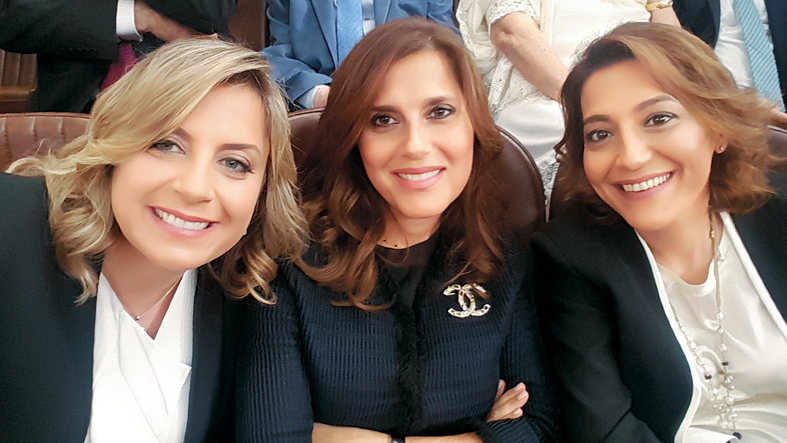
«I am proud to be part of a female sibling.»
You are a multiple woman, with various occupations. Business woman, activist, wife and mother of five children. Can you describe one of your typical days? A typical day is to be on the breach, non-stop. Each second, every minute, counts. I reply to a message, I call to follow a case, I write my mail. I attend meetings, interviews. I try to meet people’s expectations. I try to help as much as I can people who are treated unfairly, injured in their rights or in formalities. I do it out of love for justice. A typical day is a busy day for me, but it’s not to complain. I do it because that’s what I like to do.
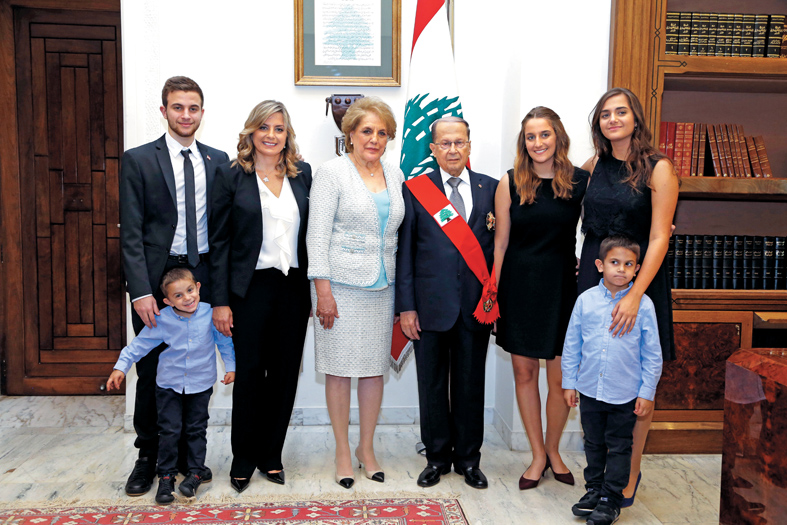
You are also a fervent ecologist. In Lebanon this sector is not well organized, on the State’s level or regarding the behavior of the citizen. What solutions would you recommend? Yes, I am a fervent environmentalist. From birth, the human being wants to breathe, to eat. His health depends on the environment in which he lives and evolves. The environment is a culture. We have a problem on two levels: the citizen who is not educated to respect the environment, to be clean, the one who throws things on the street, to talk only about basic things, and also a problem in the enforcement of environmental laws. Whether it’s about quarries, sand, trash, sanitation, areas to protect or water pollution. I still do not know why there is a shortage of sewage treatment plants that have been operating since the inception of Lebanon, and all the sewers are dumped into the sea. Many pending issues have never been resolved. Too bad. We are doing our best to improve things. Water purification centers began operating in several locations. A major reform project is needed. The environment is a two-tier problem, as you said. The question is well asked. The citizen must be responsible and respect the laws that are promulgated. The State also has management and enforcement work to do. How to cure it? Through public information campaigns, as well as education in schools, a communication on this subject. The state must do his work, take care of the projects that will enable us to preserve our environment.
Your husband, General Chamel Roukoz intends to begin a political path, seeking a seat of deputy. Do you encourage him in that direction? Why? Wouldn’t you be tempted to follow it yourself? Yes, it is a fact. He does not go into politics as much as he continues his military life. He has always been in the public sector and served his country, his people, as an officer. He has done so at the level of security, and he continues to do so in public life. He likes people, he is very close to them, and he is very attached to his country. I naturally encourage him in that direction. For my part, I would not be tempted by politics, I am in full swing. You do not have to be a member of Parliament to work and serve your country. I am assisting my father, who is the President of the Republic. It is an absorbing, useful and effective work. I feel that I am very well where I am.

What are your hobbies? Yoga, hiking, swimming, reading too. I love reading. My best hobby is to be in the wild.
And your dreams? My dreams … I realized some of them. I dreamed of starting a family, I have five children. I lived a very beautiful love story, I dreamed of it and I lived it. I dreamed of having a house, I have two, in town and in the mountains. I founded my company. It remains for me a dream to live in a clean country, among civilized people, surrounded by flowers and trees. A green country.
How do you plan for the future? I project myself into the future in what I am now. I’ve already done a lot of projects. The future for me is the present, I fight and I will continue to fight for my convictions, for my country, to make things more beautiful and better.
You have not hesitated, out of love, to overcome obstacles and to meet challenges. Do you consider yourself a passionate woman? How do you define yourself? Yes I am a passionate woman, in love. I am also an active woman, I love beautiful things and positivity. I try to focus on the beautiful things I take pictures to share on my social networks. I try not to be negative, to criticize, but to be rather constructive. I like my presence to please the people around me, to amuse them. I like spreading happiness. How do I define myself? I do not know, it’s up to you.
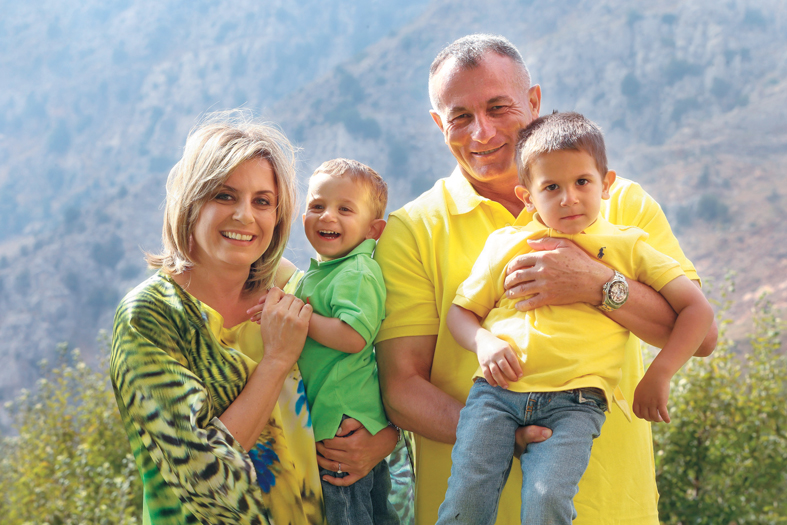
«I live the beautiful love story which I have always dreamed of.»
What remains from all these years spent in France? How have they marked you beyond the nostalgia generated from being uprooted? There was the pain of uprooting, we were uprooted but in a very violent way. We had planned our future here and from one day to the next we found ourselves in another country. The first years were painful. But I am deeply grateful to France. I have cultivated my gaze, in fact, the love of Beauty, the love of nature, the respect for the other, the laws, I owe them, in part, to my life in France, where I learned a lot. There was also solidarity among the Lebanese gathered around the Cause. We continued the struggle, but in a different way. This struggle has always existed, we lived it differently, far from ours, while remaining close. It was a fine experience, but at the same time, as you said, tinged with pain and bitterness.
The writer Germaine de Stael wrote: «Glory is the mourning of happiness».What do you think? I do not know the circumstances that Madame de Stael experienced when she took out this quote, but I believe that glory has its reverses and trials, so yes, in her trials, it can be the mourning of happiness. But happiness is not guaranteed forever, nor glory for that matter.
To conclude, what would you like to say to our readers? I would like to tell them that there is a good cultural production in Lebanon, very beautiful private initiatives. There are things that are being done. You have to look at life on the right side, do not despair. Lebanon is a crossroads of civilizations, we have our complexity but also our wealth. You have to believe in it and be attached to it. Interview Conducted by SABINE FARRA DE CERDA








